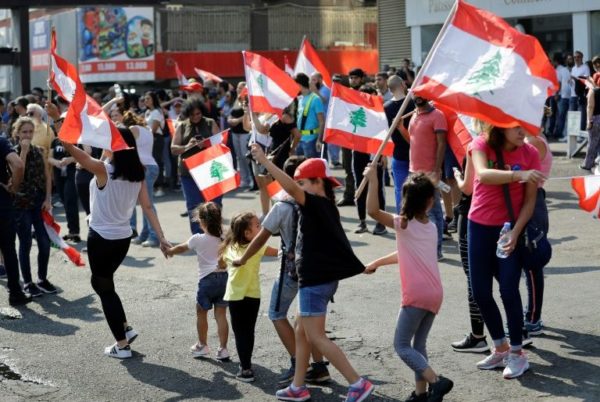
Lebanese schoolchildren have joined the protests that have rocked the country since October 17, demanding better public education and more job opportunities for school leavers (AFP Photo/JOSEPH EID)
Beirut (AFP) – The World Bank urged protest-hit Lebanon on Wednesday to form a new government quickly, warning that an economic downturn would deepen poverty and worsen unemployment.
Students boycotted classes during the day and anti-government demonstrations continued into the evening.
Since October 17, an unprecedented protest movement has targeted a political class deemed incompetent and corrupt. Demonstrations have continued despite the government’s resignation last week.
The outgoing cabinet is serving in a caretaker capacity as leaders haggle over the make-up of the next government — a delay donors say the debt-saddled country can ill afford.
The World Bank warned Wednesday that a “rapid government formation that meets the expectations of all Lebanese people is the most urgent step”.
Representatives from the Washington-based global lender met earlier with embattled President Michel Aoun, who has pledged various reforms to combat corruption following the protests.
The World Bank had forecast a contraction of 0.2 percent before the turmoil, but said Wednesday that it now expected Lebanon’s recession “to be even more significant”.
Without quick steps to address the crisis, about half of Lebanon’s population could fall into poverty and unemployment could “rise sharply”, the lender said in a statement.
“With every passing day, the situation is becoming more acute,” World Bank regional director Saroj Kumar Jha warned.
– Corruption –
Even before protests erupted last month, growth in Lebanon had stalled following repeated political deadlocks in recent years, compounded by the war in Syria.
Public debt stood at more than $86 billion, or higher than 150 percent of Gross Domestic Product, according to the finance ministry.
Moody’s ratings agency on Tuesday downgraded Lebanon’s sovereign debt, saying the anti-government protests had hit investor confidence and threatened macroeconomic stability.
Petrol stations owners said they would meet Thursday over persistent difficulties in paying for hydrocarbon imports due to dollar shortages.
A long list of grievances have spurred exasperated Lebanese to protest, but poor living conditions and corruption are near the top.
On Wednesday, the financial prosecutor asked former premier Fouad Siniora to appear next week over $11 billion allegedly spent between 2006 and 2008 when he was in office, the state-run National News Agency reported.
Siniora denied the accusations.
Last month, another prosecutor pressed charges against former prime minister Najib Mikati over allegations he wrongly received millions of dollars in subsidised housing loans, charges he denies.
Lebanon is ranked 138th out of 175 countries in Transparency International’s 2018 corruption perceptions index, with key sectarian leaders accused of running demi-fiefdoms.
After meeting the World Bank on Wednesday, Aoun said no suspect would be exempt from investigations into corruption involving current and former officials.
He said 17 such cases have already been referred for investigation.
“The next government will include competent ministers, who are not suspected of corruption,” Aoun said on Twitter, seemingly endorsing the demands of protesters.
– ‘Women’s rights not a footnote’ –
Banks opened again on Wednesday and classes resumed at many schools after a two-week gap, as demonstrators protested in various ways.
On Wednesday evening, thousands of women gathered in a central Beirut square near the seat of government, carrying candles as some banged on saucepans, an AFP correspondent said.
“O patriarchal powers, women’s rights are not a footnote,” they chanted.
On the Beirut waterfront, security forces and activists clashed after protesters tried to enter a private seaside resort, denouncing what they say is illegal privatisation of public property.
Earlier near the Palace of Justice, hundreds demanded an independent judiciary free from political interference, another AFP correspondent reported.
“We don’t want judges who receive orders,” read one protester’s placard.
Across the country, hundreds of students skipped school, refusing to return to class until protest demands are met.
On pupil in Beirut asked Lebanese TV: “What will I do with a school-leaver’s certificate if I don’t have a country?”
Economist Nassib Ghobril said protesters’ demands were aligned with those of international donors, especially in terms of the “fight against corruption” and achieving “good governance and financial rehabilitation”.
“Today, there is an opportunity to see real change,” he said.
AFP

Leave a Reply
You must be logged in to post a comment.